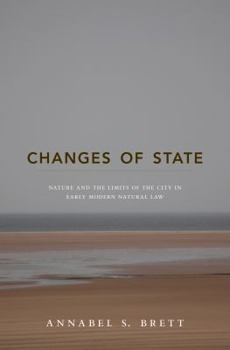Changes of State: Nature and the Limits of the City in Early Modern Natural Law
Select Format
Select Condition 
Book Overview
This is a book about the theory of the city or commonwealth, what would come to be called the state, in early modern natural law discourse. Annabel Brett takes a fresh approach by looking at this political entity from the perspective of its boundaries and those who crossed them. She begins with a classic debate from the Spanish sixteenth century over the political treatment of mendicants, showing how cosmopolitan ideals of porous boundaries could simultaneously justify the freedoms of itinerant beggars and the activities of European colonists in the Indies. She goes on to examine the boundaries of the state in multiple senses, including the fundamental barrier between human beings and animals and the limits of the state in the face of the natural lives of its subjects, as well as territorial frontiers. Drawing on a wide range of authors, Brett reveals how early modern political space was constructed from a complex dynamic of inclusion and exclusion. Throughout, she shows that early modern debates about political boundaries displayed unheralded creativity and virtuosity but were nevertheless vulnerable to innumerable paradoxes, contradictions, and loose ends.
Changes of State is a major work of intellectual history that resonates with modern debates about globalization and the transformation of the nation-state.





